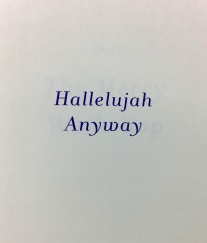I first discovered Anne Lamott last fall, when I mentioned to my friend, Grace, that I was “getting into Catholic writers again,” like Mary Karr and Thomas Merton. Grace recommended Christian writer Anne Lamott and suggested I start with her recent spiritual memoir, Small Victories (2014).
I liked Lamott immediately. I found her witty tales of growing up among the liberal literati familiar and enlightening, and her story of addiction, recovery, and faith inspiring. I picked up three more of her shorter books: Help Thanks Wow, Stitches, and Bird by Bird. As I continued to enjoy her flippant yet humble storytelling, I pre-ordered her new book, Hallelujah Anyway: Rediscovering Mercy, several months ahead of time (unprecedented).
When the much-anticipated title arrived on April 4, I smiled at it’s salmon-and-silver jacket. Flipping through the purple typeface, I thought “wohoo, Anne is back!”

Or was she?
After reading the first few pages, I had no memory of what I’d just read. I read and reread the sentences, but they weren’t cohering. Did I need sleep? Coffee? Exercise? Earplugs?
I put the book down. I’d try again later.
To regain confidence in my reading comprehension, I picked up Elif Batuman’s new book The Idiot. My quest was a success – The Idiot is not only intelligible, but one of the best novels I’ve read in the last few years (review to come).
A week later, I opened Hallelujah Anyway again. I started from the beginning, hoping for a fresh start.
Again, I met frustration. It soon became clear that Lamott’s writing – the very same writing I had grown to love and trust in Small Victories, Stitches, and Help Thanks Wow – was at fault. Something had gone terribly wrong.
Take the excerpt on the back cover, for instance:
“I’m not sure I even recognize the ever-presence of mercy anymore, the divine and the human: the messy, crippled, transforming, heartbreaking, lovely, devastating presence of mercy. But I have come to believe that I am starving to death for it, and my world is, too.”

That is eight adjectives to describe mercy, the majority of which conjure abstract concepts. Anne invites us to “rediscover mercy” via the dictionary.
Sentences like the one above comprise seventy-five percent of the book. Lamott flits from line to line, paragraph to paragraph tacking so many different descriptors to mercy that the word begins to fade out of focus.
“Mercy means radical kindness. . . Mercy brings us to the miracle of apology, given and accepted, to unashamed humility when we have erred or forgotten. . . Mercy, grace, forgiveness and compassion are synonyms, and the approaches we might consider taking when facing a great big mess, especially the great big mess of ourselves – our arrogance, greed, poverty, disease, prejudice.”

Lamott gives us too many options. Mercy is a, b, c, and maybe also d; it’s the f and g of h and j. Her sentences feel urgent and unsettled, losing the reader with sharp turns at each comma. I found myself re-reading often, searching for the elusive pearls of Lamott wisdom I had come for. But by the next sentence, Lamott had apparated elsewhere, leaving me sighing with annoyance.
There are moments where Lamott slows down, where glimpses of her former self appear. These are instances in which she approaches mercy anecdotally. For example, Lamott tells the story of her Jesuit priest friend Tom’s experience at an AA meeting in LA, in which a drunk man soils himself walking into the meeting and a team of people help him shower and clean up. She describes retail exhaustion in Zoologie (surely a thinly disguised Anthropologie) in which a salesgirl finds her on a couch and offers a tiny paper cup of water.
Unfortunately, these stories are few and far between. One must trudge through the muck, braving confusion and whiplash:
“Something is at work mending the cut on my hand right now, as if hidden in the skin with atomic knitting needles. Over the years, when it has been in the mood and has its nursing cap on, this something has imperfectly patched up the rifts in my damaged family, the deeper dents in my heart, let alone evil in South Africa, has transformed us from clenched, victimized, and shut down, to taking gulps of fresh air like a baby pinking up.
“Horribly, it does not issue printed schedules.”
As Washington Post contributer Anne Bauer aptly put it in her review: “I’m sorry. What?”
In Bird by Bird: Some Instructions on Writing and Life (1994), Lamott likens writing to hosting. She suggests that readers arrive at one’s pages seeking communion, and it’s the writers’ job to welcome them home. In Hallelujah Anyway, Lamott is a well-meaning but harried host – multi-tasking and inattentive. She’s dodging through rooms greeting newcomers, moving appetizers in and out of the oven, rearranging the shoe pile, looking for a ladder to fix a burnt-out bulb. One wishes she would put it all down, come sit by us on the couch, and do what she does best: tell a story.
Love this!
Also, hilarious use of ‘apparated.’
Can’t wait to check out some of the other posts.
You rule.
LikeLike
Thx, Kit!
I am regrettably sporadic w/ the posting… I swear I have read more than 5 books in the last 5 years.
LikeLiked by 1 person
Lulu is about to read one by Julian Barnes for school. ‘The Sense of an Ending.’ If i get my shit together, i may try to read at same time so that i can annoy her with my own analysis along the way.
Fun!
LikeLiked by 1 person